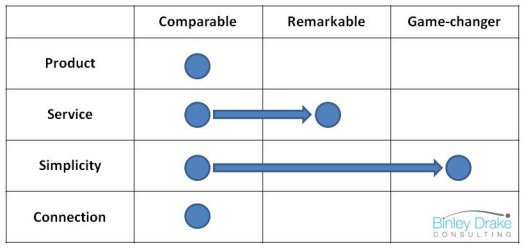There are two mind-sets when it comes to strategy: incremental and transformational. Both work, but only one will get you to a game-changer.
In sport, Dave Brailsford and Clive Woodward were masters of the incremental gain, the “will it make the boat go faster” school of simple, consistent improvement – and both have been incredibly successful. But William Webb-Ellis and Dick Fosbury? They were transformational.
They didn’t excel at the games they played, they changed them forever.
The first Dyson was a product game-changer. Uber is changing the game on service. Amazon (in the chart below) do remarkable service but it’s simplicity where they changed the game. Harley Davidson and Facebook have both changed the game, each in different ways, in with the connection they made with their customers' lives. But only Apple, you could argue, have come close to doing it across all four.

The last 20 years are peppered with examples of small teams with big ideas changing the game in one of those four areas. Why small teams? Because big companies don’t want the game to change (Apple might be the exception but Kodak is the rule). They’re winning at the game right now, and transformational change could make everything they’ve built obsolete.
The fastest way for a small business to win big, is to change the game.
So what’s your game-changer? Make a copy of this chart and mark where you are now versus your competition in each of the four areas. Where might the game-changer be for you? What would it look like, and with focus and resolve, how could you achieve it?
Think big. In the words of Margaret Mead “Never doubt that a small group of thoughtful, committed citizens can change the world; indeed, it's the only thing that ever has.”